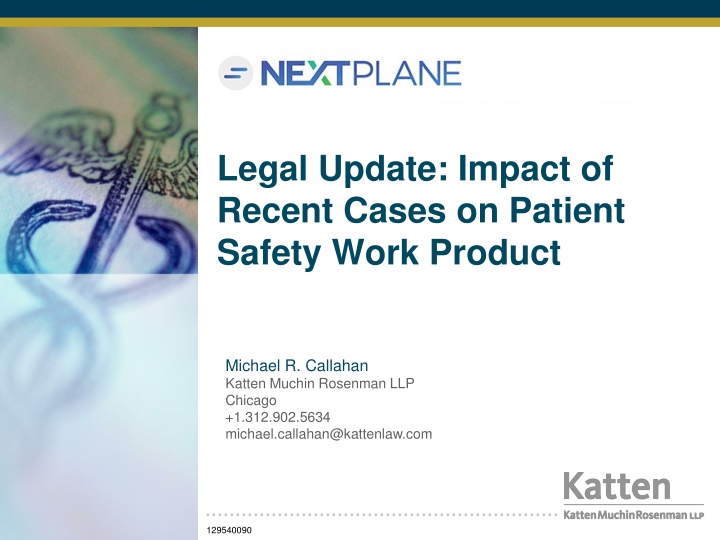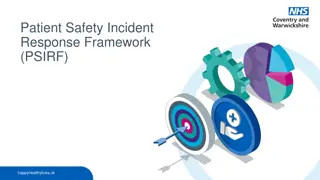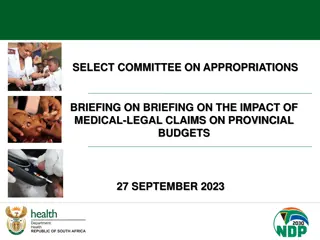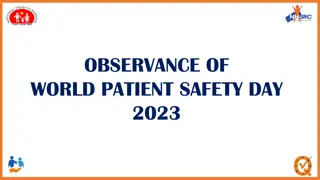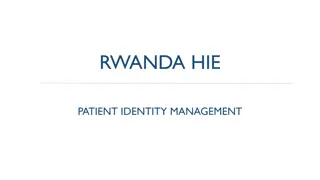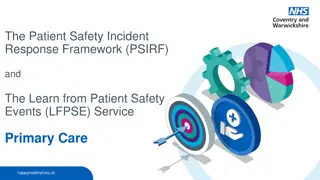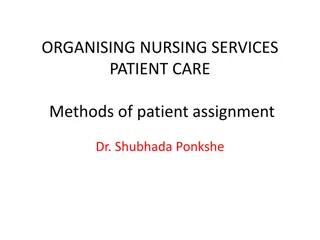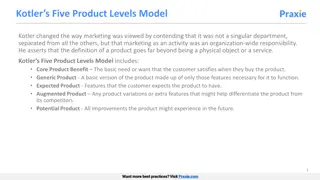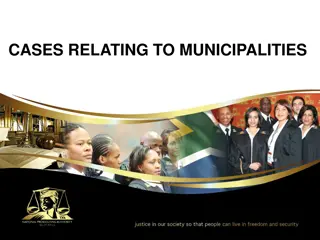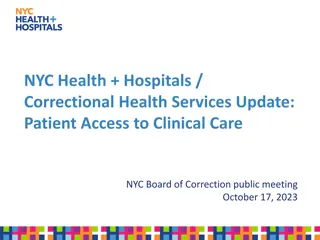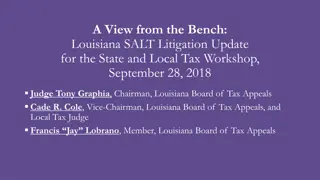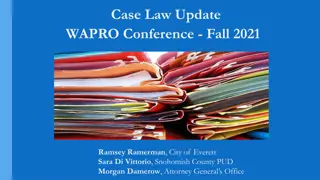Impact of Recent Cases on Patient Safety Work Product Legal Update
This update discusses the impact of recent appellate court decisions on patient safety work product, including key takeaways, litigation lessons learned, and recommendations for maximizing privilege protections under the Patient Safety Act.
Download Presentation

Please find below an Image/Link to download the presentation.
The content on the website is provided AS IS for your information and personal use only. It may not be sold, licensed, or shared on other websites without obtaining consent from the author.If you encounter any issues during the download, it is possible that the publisher has removed the file from their server.
You are allowed to download the files provided on this website for personal or commercial use, subject to the condition that they are used lawfully. All files are the property of their respective owners.
The content on the website is provided AS IS for your information and personal use only. It may not be sold, licensed, or shared on other websites without obtaining consent from the author.
E N D
Presentation Transcript
Legal Update: Impact of Recent Cases on Patient Safety Work Product Michael R. Callahan Katten Muchin Rosenman LLP Chicago +1.312.902.5634 michael.callahan@kattenlaw.com 129540090
Speaker Bios Michael R. Callahan, Partner - michael.callahan@kattenlaw.com Michael R. Callahan assists hospital, health system and medical staff clients on a variety of health care legal issues related to accountable care organizations (ACOs), patient safety organizations (PSOs), health care antitrust issues, Health Insurance Portability and Accountability Act (HIPAA) and regulatory compliance, accreditation matters, general corporate transactions, medical staff credentialing and hospital/medical staff relations. Michael's peers regard him as "one of the top guys [ ] for credentialing he's got a wealth of experience" (Chambers USA). Additionally, his clients describe him as "always responsive and timely with assistance," and say he is "informed, professional and extremely helpful" and "would recommend him without reservation" (Chambers USA). Michael's clients also commend his versatility, and say "He is willing to put on the hat of an executive or entrepreneur while still giving legal advice," according to Chambers USA. He is a frequent speaker on topics including ACOs, health care reform, PSOs, health care liability and peer review matters. He has presented around the country before organizations such as the American Health Lawyers Association, the American Medical Association, the American Hospital Association, the American Bar Association, the American College of Healthcare Executives, the National Association Medical Staff Services, the National Association for Healthcare Quality and the American Society for Healthcare Risk Management. Michael was recently appointed as chair of the Medical Staff Credentialing and Peer Review Practice Group of the American Health Lawyers Association. He also was appointed as the public member representative on the board of directors of the National Association Medical Staff Services. He was an adjunct professor in DePaul University's Master of Laws in Health Law Program, where he taught a course on managed care. After law school, he served as a law clerk to Justice Daniel P. Ward of the Illinois Supreme Court. 1 1 1
Presentation Goals General comments regarding current Patient Safety Act ("PSA") legal landscape. Provide an overview of the Court decision in University of Kentucky v. Bunnell and Edwards v. Thomas. Identify the key takeaway points and arguments to raise when responding to a litigation, regulatory or other legal demand to disclose PSWP. Provide recommendations and Litigation Lessons Learned regarding operational, legal and other steps to take in order to maximize the privilege protections under the PSA. 2 2 2
Legal Landscape Key Appellate Court Decisions IDFPR v. Walgreens (Il. App. Ct. (2012)) First appellate court decision to uphold and apply the privilege protections under the PSA. Tibbs v. Bunnell (Ky. 2014) Kentucky Supreme Court decision in a non- binding plurality opinion which held that incident investigation reports are not PSWP because Kentucky statutes require that they be collected and maintained as part of a hospital's recordkeeping requirement. Baptist Health Richmond, Inc. v. Clouse (Ky. 2016) Kentucky Supreme Court adopts its previous decision and also relies on HHS PSO Guidance interpretation that records which are subject to mandated reporting or recordkeeping requirements are not PSWP and identifies a standard for when in camera reviews are appropriate by a trial court. Southern Baptist Hospital of Florida, Inc. Charles (Fla. 2017) Florida Supreme Court holds that documents in dispute were adverse medical incident reports and "original records" under the PSA and therefore were subject to discovery under Amendment No. 7. It also held that the PSA did not preempt Amendment 7. 3 3 3
Legal Landscape Regulatory Guidance Patient Safety and Quality Improvement Act of 2005 HHS Guidance Regarding Patient Safety Work Product and Providers' External Obligations (May 2016). Summary Aside from Walgreens, these decisions combined with the Guidance provide a much more restrictive interpretation regarding the scope of privilege protections provided under the PSA. Therefore it is not surprising that plaintiffs attorneys are relying on these authorities to support their demand for reports which hospitals and other providers claim are PSWP. 4 4 4
UK v. Bunnell Factual Background Case involved a medical malpractice action in which the surgeon operated on the wrong site which ultimately led to the patient s death. Plaintiff served a subpoena to require the hospital to produce an "event report" as well as any other investigative notes and/or data regarding the treatment of care/death of the patient. Hospital claimed that the requested information was PSWP and filed a petition for a writ to prohibit the trial court from enforcing an order requiring that this information be produced. 5 5 5
UK v. Bunnell Issue on Appeal Does the Kentucky statute in question require hospitals to submit or to collect and maintain adverse event reports which, therefore, cannot be treated as PSWP. The trial court judge actually stated on the record that she was looking for guidance from the Appellate Court on how to handle these discovery disputes. At the outset, the Kentucky Court of Appeals, in granting the writ, concluded that the Tibbs case was not binding because it was a plurality versus a majority decision and that Clouse did not specifically address whether the statute in question mandates record keeping or reporting. A third case, Frankfort Regional Medical Center v. Shepherd (Ky. June, 2016) was deemed by the Kentucky supreme court as not being worthy of publication. 6 6 6
Analysis Is the Disputed Information PSWP? What is it? A 10-page event report chronicling a wrong site procedure performed at the hospital. Court notes that PSWP includes reports, written or oral statements which identify or constitute the deliberations or analysis pursuant to a PSES and therefore could also apply to other investigative notes requested by plaintiff. Why was it generated? Must have been created with the intent that it is part of a provider's voluntary participation in the PSA within it s PSES and not documentation necessary for regulatory compliance. The un-contradicted affidavit stated that report was generated within UK s PSES, and in accordance with its policies, was submitted to the PSO and did not exist separately from the hospital s PSES. 7 7 7
Analysis Is the Disputed Information PSWP? Might it improve overall patient care? The report in question contained patient demographics, basic event details including the reporter s assessment of the circumstances prompting the report, basic analyses, and manager reviews of the wrong site procedure. Appellate Court concludes that information in question was PSWP because all three criteria were met. 8 8 8
Analysis - Did Any PSWP Exceptions Apply? Was the information prepared for a purpose other than for reporting to a PSO? Original patient records include a patient's medical record, billing and discharge information or other original patient record. Under Kentucky law, hospitals are obligated to maintain a patient admission and discharge registry, birth registry and a surgical registry but hospital could also maintain records deemed necessary or useful to patient care although not required by law. The Court concluded that the event report in question was not an original patient record. 9 9 9
Analysis - Did Any PSWP Exceptions Apply? Was the document prepared to meet an external obligation? "External obligations" is not a statutory term but appears in the Guidance which states that external obligations must be met with information that is not [PSWP] . Court states that if a report was intended from its inception to be developed within a PSES for submission to a PSO, it qualifies as PSWP once the information or report is submitted to the PSO, however, it s characterization as PSWP is immutable. If a law imposes a recordkeeping or reporting of information obligation on a hospital, for any reason, that requirement is an external obligation and the information cannot be considered PSWP. 10 10 10
Analysis - Did Any PSWP Exceptions Apply? After a detailed analysis of existing and proposed Kentucky legislation, and despite a footnote in the Guidance which states otherwise, the Court concluded that there is no required adverse medical event reporting by medical providers in Kentucky. The Court noted that Kentucky does in fact have a list of reports which must be submitted to the state such as active tuberculosis, suspected child abuse or neglect, animal bites or HIV and other diseases but not an adverse medical event report. The state also requires mandatory data collection and reporting as well as informing the public of its requirement and efforts to create an internal quality assurance or improvement program which must include a description of its structure and its guidelines for quality care studies and monitoring, among other obligations. 11 11 11
Analysis - Did Any PSWP Exceptions Apply? But there is nothing under Kentucky law that requires the creation of or separate record-keeping of patient-specific or event-specific reports of adverse medical events. The Court states, however, that any reports a hospital prepares voluntarily to guide the operations, measure productivity and reflect programs of the facility which is done separate and apart from its PSES, even if it did not meet a external obligation, would not be considered PSWP. If it was prepared for a purpose other than for reporting a PSO it is not PSWP. Kentucky also has a statute which specifically states that a hospital s compliance with other federal or state regulations which address quality assurance and quality improvement requirements shall suffice for compliance with the obligation to create an internal quality assurance or improvement program. 12 12 12
Analysis - Did Any PSWP Exceptions Apply? Specific examples cited by the Court were a hospital s voluntary participation in the Medicare program, The Joint Commission accreditation program and even the PSA. Reporting an adverse medical event to a PSO, does not make the report created pursuant to the Act an original provider record needed to satisfy an external obligation that would disqualify it as PSWP and except it from the protection of the Act s privilege. Participation in the PSA satisfies the Kentucky requirements so there would never be an unmet external obligation to the state . It would be absurd to say that the same state sanctioned participation in the Patient Safety Act that entitles a hospital to claim the privilege, simultaneously defeats the privilege. 13 13 13
Analysis - Did Any PSWP Exceptions Apply? Does Kentucky impose a recordkeeping obligation on hospitals? The Court next looked to whether the Kentucky statute which references incident investigation reports created a record keeping obligation on UK such that the event report could not be considered PSWP. The Court notes that these reports are one of six listed under the title Administrative Records and are considered the hospital s business records that an administrator will maintain in the regular course of business . It observed that an incident investigation report does not mean an adverse medical incident involving patients and could mean any adverse incident such as an employee injury or sexual harassment report. 14 14 14
Analysis - Did Any PSWP Exceptions Apply? These reports are listed under Administrative Records and Reports and not under another section titled Medical and Other Patient Records . Moreover, this section of the statute does not contain the unequivocal language set forth in other statutory provisions which specifically state that certain records shall be maintained or that the hospital shall complete and submit , such as medical records or a licensure application. This section of the statute also gives the hospital the discretion of establishing, maintaining and utilizing these business records as necessary and therefore it is the hospital which decides whether or not to create such a report. 15 15 15
Analysis - Did Any PSWP Exceptions Apply? To support this conclusion that the records in question were not required to meet a federal or state external obligation , the Court cites to a letter prepared by the Inspector General of the Cabinet Office of Inspector General of the State of Kentucky which states as follows: The plain meaning of [the statute] is that a licensed hospital is not required to affirmatively or regularly submit, transmit, or otherwise provide to the OIG an incident investigation report. A licensed hospital is expected to demonstrate it follows an effective and meaningful process for establish[ing], maintain[ing] and utilize[ing] incident investigation reports under the regulation, but the regulation does not require each licensed hospital to adhere to the same process or that a hospital automatically submit such reports to OIG. 16 16 16
Analysis - Did Any PSWP Exceptions Apply? The letter goes on to note that even if there was a change in the regulations regarding mandated recordkeeping or reporting obligations or if the OIG requested documents that could be characterized as an incident investigation reports the regulation does not require a licensed hospital to disclose any record deemed confidential by [the Patient Safety Act] The Court further points out that in the event laws and regulations change, the hospital has the option of dropping out information collected within its PSES which has not yet been reported to the PSO. In the alternative, a provider could conduct an analysis with non- PSWP outside of its PSES to satisfy the requirement, even if the analysis involves identical issues and information on which the initial report was based. 17 17 17
Analysis - Did Any PSWP Exceptions Apply? Hospitals also have the ability to prepare a written authorization to disclose its own PSWP where it disagrees with an administrative agency that the information in question is not eligible for PSWP protection information remains PSWP. 18 18 18
Analysis - Did Any PSWP Exceptions Apply? Did the hospital have a voluntary external obligation based on conditions of program participation? Court observed that hospitals participate in voluntary programs such as in Medicare and Medicaid and that there are mandatory conditions if they choose to participate. With respect to Medicare, the Court points out the following: It is the hospital and not the government that specifies the frequency in detail of data collection. The Medicare regulations sanction and defer to the PSA regarding compliance with Medicare regulations in terms of what information to place within a hospital's PSES, how it will use any PSA exceptions and how it will demonstrate compliance with the CoPs. Court states that there is no direct mandatory reporting, disclosure or recordkeeping obligation as a condition of participation in the Medicare and Medicaid services programs . 19 19 19
Analysis - Did Any PSWP Exceptions Apply? In this way, the Medicare participation program is very much the model of Kentucky s law and implicitly sanctions participation in the PSA program and allows that such participation shall suffice for compliance with standards in this section The federal mandate under Medicare is for hospitals to establish a process for self-examination and improvement and that a hospital assures CMS and HHS that its quality assessment and performance improvement program is established and in operation. This assurance is established by a hospital s participation in an accrediting body such as The Joint Commission which means that an accredited hospital is automatically deemed to comply with the Medicare CoPs. 20 20 20
Analysis - Did Any PSWP Exceptions Apply? In a response to plaintiff s argument that The Joint Commission requires the preparation of an adverse incident or similar event report as a condition to it s voluntary participation and that therefore the report qualifies as an external obligation, the Court rejected the argument based on the following: The evidence contradicts the plaintiff s assertion that the report existed separate from the hospital's PSES. PSWP that was sent to a PSO cannot satisfy an external obligation. Reporting to The Joint Commission is not a condition of participation. 21 21 21
Analysis - Did Any PSWP Exceptions Apply? As the Kentucky Supreme Court observed in the Frankfort Regional Medical Center an unpublished decision, hospitals are strongly encouraged but not required to report to The Joint Commission any patient safety events that meet the definition of a sentinel event. Rather, hospitals must have a process to identify the cause of similar adverse medical events and to take appropriate action to avoid repeat occurrences. When a hospital collects information within its PSES and deliberates whether the information must satisfy an external obligation those deliberations are privileged. If a report is submitted to the PSO it eliminates the factual question of the hospital s intended purpose and the report becomes perpetually PSWP . If in fact such a report was required to meet an external obligation after it has already been reported, the hospital s option to comply would be conduct a new analysis outside of the PSES with non-PSWP. 22 22 22
Analysis - Did Any PSWP Exceptions Apply? Did the Hospital Create the Disputed Documents Under Kentucky Law As Necessary to Guide the Operation, Measure Productivity, and Reflect the Programs of the Facility? Hospitals which create records and reports as part of its standard business procedures to guide its operations and which are developed and exist separately from PSES are not PSWP. For example, if a hospital created a root cause analysis or sentinel event report outside of its PSES and submitted it to The Joint Commission it would not be considered PSWP. Conversely, because participation in The Joint Commission is voluntary and reports are not required, if the hospital created an RCA in its PSES for the purpose of reporting to a PSO and reported it then it is PSWP and was not developed to meet an external obligation. 23 23 23
Overview and Summary of Edwardsv.Thomas Factual Background Patient developed stomach pain and was diagnosed with gallstones. A laparoscopic cholecystectomy was performed but surgeon failed to timely realize that he had cut the patient s common bile duct. This discovery was made during a return to the ED and patient was transferred to Tampa General for emergency surgery. The hospital and the surgeon were sued for malpractice. 24 24 24
Overview and Summary of Edwardsv.Thomas Plaintiff sought records relating to adverse medical incidents that occurred at the hospital. Hospital objected stating that certain records: Did not relate to adverse medical incidents Were "not made or received in the course of business" Were protected attorney client privilege Were protected opinion work product No PSWP privilege was asserted. 25 25 25
Overview and Summary of Edwardsv. Thomas Trial Court Decision Court ordered all documents to be produced. One of the documents was an external review of prepared by MD Review at the request of the hospital s attorney. Second District Court of Appeals Decision The Court determined that the external reports were not "made or received in the course of business" because MD Review did not perform the routine function of reviewing all adverse medical incident for the hospital. Also, the external reports were created by an expert retained by an attorney in anticipation of litigation and thus were not made in the ordinary course of business. Therefore the records in question did not fall under Amendment 7 which otherwise gives patients broad access to any and all adverse medical incident reports. 26 26 26
Overview and Summary of Edwards v.Thomas Florida Supreme Court Decision A reading of the decision reflects the Court's position that Amendment 7, which was approved by popular vote in a constitutional referendum, allows for broad discovery access to any and all records relating to an adverse medical incident irrespective of whether it was prepared pursuant to Florida laws, which require that certain reports be prepared and reported to the state or collected and maintained, or was prepared voluntarily by the hospital. Amendment 7 expresses a clear intent to eliminate any restrictions to accessing these reports if made in the ordinary course of business by "any health care facility peer review, risk management, quality assurance, credentials or similar committee, or any representative of any such committee." (Emphasis added) 27 27 27
Overview and Summary of Edwards v. Thomas Amendment 7 access is not limited to the listed statutory internal committees because reference to the phrase "similar committee" applies to committees which were established beyond these committees. Court ignored and did not even address the hospital's argument that MD Review was not an external committee but was simply an outside expert retained by its legal counsel to review certain medical records. Court expressed a concern that allowing hospitals to "outsource their adverse medical incident reporting to external, voluntary risk management committees separate from those required by the Florida statutory scheme" would "provide a trap door through which hospitals could avoid their discovery obligations" 28 28 28
Overview and Summary of Edwards v. Thomas Court again ignored the fact that MD Review was not acting as a committee and its separate report was not prepared in order for the hospital to meet a statutory obligation Court relies on its decision in Charles to hold that the MD Review report in question was prepared as part of the hospital's daily operations in responding to an adverse event in ways to improve patient care and therefore was created in the ordinary course of business Court again ignores the facts in Charles which focused on reports that the hospital was required to report or collect and maintain under Florida law. The other cases which it cites only addressed medical and business records. 29 29 29
Overview and Summary of Edwards v. Thomas Court also equates the requirement to maintain peer review processes and an internal risk management program as therefore being able to access any materials prepared through these processes which relate to an adverse medical incident because they were made in the ordinary course of business. In response to the hospital's argument that the MD Review report was protected from discovery under either the attorney work product or attorney-client privilege the Court pointed out that "fact work product", which only addresses a client's factual information, is not privileged versus "opinion work product", which relates to the attorney's mental impressions, conclusions, opinions and theories, which is privileged 30 30 30
Overview and Summary of Edwards v. Thomas Because the record did not present any evidence that any opinion work product was involved, the "external peer review reports" were discoverable if they contained fact work product Dissenting Opinion "Work product prepared in anticipation of litigation is the antithesis of records made or received in the course of business" and therefore are not discoverable under Amendment 7 31 31 31
Overview and Summary of Edwards v. Thomas MD Review does not perform a routine function of reviewing a hospital's incident reports but simply provided an expert opinion as to the standard of care "on sporadic incidents when litigation is imminent" at the request of the hospital's legal counsel. There was no evidence that the hospital sought the review as part of its regular peer review or risk management processes or statutory requirements. The clear legislative history of Amendment 7 reveals an intent not to "destroy the work-product or attorney-client privilege" or to "infringe on the statues and rules delineating attorney-client privilege" also citing to a 2004 Florida Supreme Court opinion. 32 32 32
Operational and Legal Options and Arguments Operational Options Limit the amount of sensitive detail contained in external and internal reports. Stick to facts and conclusions as much as possible. Make use of the "deliberations and analysis" pathway for creating PSWP. Information immediately becomes PSWP without any reporting obligation to a PSO. Oral communications are not adverse medical incident reports. Patient safety activities conducted within a PSES unrelated to adverse medical incidents are not affected by Charles and Edwards - keep separate 33 33 33
Operational and Legal Options and Arguments Consider having the PSO conduct a review of an adverse event separate and distinct from any reporting or record collection and maintenance obligation. PSOs are creatures of federal law and do not have any state record reporting or record keeping obligations. Their work product is PSWP and they are not subject to subpoenas. Consider having a related corporate entity, such as the corporate member, conduct the review for the same reasons. PSOs can also engage outside independent contractors, such as an MD Review, to review and prepare outside reports 34 34 34
Operational and Legal Options and Arguments When utilizing an outside party or a PSO, create a paper trail/written agreement which clearly states that they are not serving as an external committee acting on behalf of the hospital or in order to satisfy any statutory obligation - use independent contractor language and make clear that only opinions are being provided. Remember that risk management information and activities relating to claims and litigation support will not be considered PSWP. Keep this information separate from peer review, quality and other patient safety activities and documents identified in the PSES 35 35 35
Operational and Legal Options and Arguments When retaining legal counsel to provide or obtain an expert's opinion make sure that the engagement/paper trail includes the following: Neither the attorney nor the outside expert are serving as a member or agent of a hospital committee or as an external committee or on behalf of such a committee to satisfy a statutory risk management, peer review or other required state or accrediting body record reporting or record keeping requirement The outside expert should simply be providing an opinion to the attorney in order for the attorney to formulate an opinion and advice to the hospital in anticipation of litigation and not for the purpose of satisfying a statutory requirement establish that it is opinion versus fact work product Retention of the expert by the attorney should make clear that the expert is an independent contractor to the attorney and not the hospital 36 36 36
Operational and Legal Options and Arguments Legal Arguments Edwards is not a Patient Safety Act case - the hospital did not argue that the reports in dispute were PSWP Although Florida trial and appellate courts may be guided by Florida Supreme Court's interpretation of Amendment 7, in Edwards, it is not binding precedent when a hospital asserts PSWP privilege protections In Charles, the Court's focus was on reports which it viewed as record reporting or record keeping obligations under Florida law. It did not directly address other kinds of reports that were created outside of these obligations Participation in a voluntary federal program such as the Patient Safety Act is not conducting operations in the ordinary course of business 37 37 37
Operational and Legal Options and Arguments Neither the CMS Conditions of Participation or QAPI nor The Joint Commission accreditation standards have reporting or record keeping requirements that would require reports, which otherwise qualify as PSWP, to be discoverable (See Kentucky Court of Appeals decision in University of Kentucky v. Bunnell (No. 2017-CA- 000543-OA, October 20, 2017) The Charles decision was based, in part, on the Kentucky Supreme Court's decision in Clouse which relied on the Tibbs decision that a Kentucky statute imposed a record keeping obligation to maintain incident investigation reports thus making such reports discoverable. 38 38 38
Operational and Legal Options and Arguments The Kentucky Court of Appeals in the Bunnell case, in a detailed statutory analysis, concluded that no such obligation existed. It also pointed out that the Guidance erroneously concluded that Kentucky had mandated reporting, which it does not, and that Tibbs was correctly decided. Consequently the impact of the non-binding Guidance is further diminished as a source of support for plaintiffs. Do a deeper dive of all relevant state statutes as did the Kentucky Court of Appeals in Bunnell. Assert attorney-client and work product privileges as per the recommendations above after consulting with legal counsel Consult your legal counsel 39 39 39
Additional Litigation Lessons Learned and Questions Raised Most plaintiffs/agencies will make the following types of challenges in seeking access to claimed PSWP: Has the provider contracted with a PSO? When? Is the PSO certified? Was it recertified? Did the provider and PSO establish a PSES? When? Was the information sought identified by the provider/PSO as being collected within a PSES? Was it actually collected and either actually or functionally reported to the PSO? What evidence/documentation? Plaintiff will seek to discover your PSES and documentation policies. 40 40 40
Additional Litigation Lessons Learned and Questions Raised If not yet reported, what is the justification for not doing so? How long has information been held? Does your PSES policy reflect a practice or standard for retention? Has information been dropped out? Did you document this action? Is it eligible for protection? Has it been used for another internal purpose? What was the purpose? Was it subject to mandatory reporting? Will use for any other purposes result in loss of protection? May be protected under state law. 41 41 41
Additional Litigation Lessons Learned and Questions Raised Is provider/PSO asserting multiple protections? If collected for another purpose, even if for attorney-client, or in anticipation of litigation or protected under state statute, plaintiff can argue information was collected for another purpose and therefore the PSQIA protections do not apply. Is provider/PSO attempting to use information that was reported or which cannot be dropped out, i.e., an analysis, for another purpose, such as to defend itself in a lawsuit or government investigation? Once it becomes PSWP, a provider may not disclose to a third party or introduce as evidence to establish a defense. Is the provider required to collect and maintain the disputed documents pursuant to a state or federal statute, regulation or other law or pursuant to an accreditation standard? Did provider voluntarily create documents for business purposes outside of its PSES with no intent to report to a PSO? 42 42 42
Additional Litigation Lessons Learned and Questions Raised Document, document, document PSO member agreement PSES policies Forms Documentation of how and when PSWP is collected, reported or dropped out Detailed affidavits Separate Attorney-client privilege protections Independent contractor agreements Utilization of disclosure exceptions 43 43 43
Additional Litigation Lessons Learned and Questions Raised Advise PSO when served with discovery request. Educate defense counsel in advance work with outside counsel if needed. Get a handle on how adverse discovery rulings can be challenged on appeal. 44 44 44
QUESTIONS 45 45 45
Katten Muchin Rosenman LLP Locations AUSTIN One Congress Plaza 111 Congress Avenue Suite 1000 Austin, TX 78701-4073 +1.512.691.4000 tel +1.512.691.4001 fax HOUSTON 1301 McKinney Street Suite 3000 Houston, TX 77010-3033 +1.713.270.3400 tel +1.713.270.3401 fax LOS ANGELES CENTURY CITY 2029 Century Park East Suite 2600 Los Angeles, CA 90067-3012 +1.310.788.4400 tel +1.310.788.4471 fax ORANGE COUNTY 100 Spectrum Center Drive Suite 1050 Irvine, CA 92618-4960 +1.714.966.6819 tel +1.714.966.6821 fax WASHINGTON, DC 2900 K Street NW North Tower - Suite 200 Washington, DC 20007-5118 +1.202.625.3500 tel +1.202.298.7570 fax CHARLOTTE 550 South Tryon Street Suite 2900 Charlotte, NC 28202-4213 +1.704.444.2000 tel +1.704.444.2050 fax IRVING 545 East John Carpenter Freeway Suite 300 Irving, TX 75062-3964 +1.972.587.4100 tel +1.972.587.4109 fax LOS ANGELES DOWNTOWN 515 South Flower Street Suite 1000 Los Angeles, CA 90071-2212 +1.213.443.9000 tel +1.213.443.9001 fax SAN FRANCISCO BAY AREA 1999 Harrison Street Suite 700 Oakland, CA 94612-4704 +1.415.293.5800 tel +1.415.293.5801 fax CHICAGO 525 West Monroe Street Chicago, IL 60661-3693 +1.312.902.5200 tel +1.312.902.1061 fax LONDON 125 Old Broad Street London EC2N 1AR United Kingdom +44.0.20.7776.7620 tel +44.0.20.7776.7621 fax NEW YORK 575 Madison Avenue New York, NY 10022-2585 +1.212.940.8800 tel +1.212.940.8776 fax SHANGHAI Suite 4906 Wheelock Square 1717 Nanjing Road West Shanghai 200040 P.R. China +86.21.6039.3222 tel +86.21.6039.3223 fax Katten refers to Katten Muchin Rosenman LLP and the affiliated partnership as explained at kattenlaw.com/disclaimer. www.kattenlaw.com Attorney advertising. Published as a source of information only. The material contained herein is not to be construed as legal advice or opinion.
